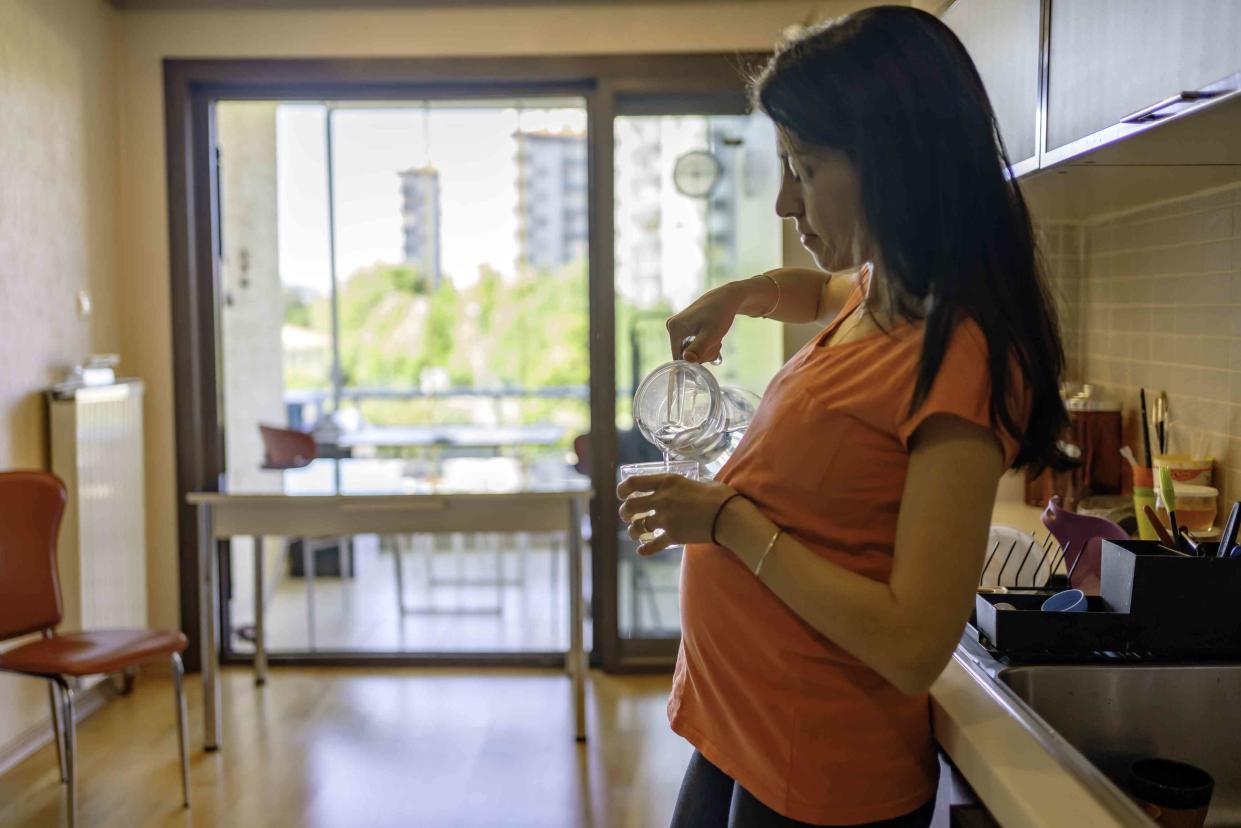How Many Weeks Does Morning Sickness Last?

Phynart Studio / Getty Images
Medically reviewed by Peter Weiss, MD
Eight out of 10 pregnant people experience morning sickness, which is nausea with or without vomiting during pregnancy. It typically occurs around week six and goes away after the first trimester (between weeks 14 and 16). However, severe forms of morning sickness can last longer.
Despite its name, morning sickness doesn’t always mean you’ll have nausea in the morning. Some people experience mild nausea in the morning, while others have bouts of sickness or nausea throughout the day.
This article reviews whether morning sickness reveals anything about the baby’s sex, the timeline of morning sickness, what not getting morning sickness means, remedies for it, and the symptoms of severe morning sickness.

Phynart Studio / Getty Images
Related: Pregnancy
Does Morning Sickness Mean You’ll Have a Boy, or Girl?
Some people believe that morning sickness means you are carrying a female rather than a male. About 80% of pregnant people experience morning sickness. This makes it unlikely that mild to moderate nausea or vomiting indicates the sex of the baby.
However, a small group of studies shows that those with a severe form of morning sickness, hyperemesis gravidarum, are more likely to give birth to females. Researchers note, however, that more, extensive research and larger population studies are needed to verify or refute this claim.
Hyperemesis Gravidarum
Hyperemesis gravidarum is a serious health condition that involves excessive nausea and vomiting during pregnancy. It can lead to significant weight loss, dehydration, and nutrient deficiencies.
Timeline of Morning Sickness
Some pregnant people experience morning sickness as early as the fourth weeks of pregnancy, but it typically starts around week six and peaks around week nine. Most morning sickness disappears between weeks 14 and 16 (after the first trimester). About 15% to 20% have morning sickness that lasts into the second trimester, and with 5%, it lasts until delivery.
Does Morning Sickness Only Occur in the Morning?
For many, morning sickness occurs in the afternoon or evening. One study reports that 80%–95% of pregnant people report nausea with or without vomiting in the afternoon or throughout the day.
What Does Not Getting Morning Sickness Mean?
Not experiencing morning sickness does not necessarily mean something is wrong with your pregnancy. Some people are less prone to the symptom and may experience other signs or symptoms, such as fatigue or breast tenderness, more intensely.
But if morning sickness suddenly goes away before the second trimester (after already having it) or if you suddenly stop having other pregnancy symptoms, it could mean something is out of the norm with the pregnancy, and you should notify your healthcare provider.
Causes of Morning Sickness
While the exact cause of morning sickness is unknown, many experts believe it is a sign that your body is adjusting to hormone shifts. Examples of hormone levels that could affect morning sickness are human chorionic gonadotropin (hCG, the hormone that pregnancy tests detect), estrogen, progesterone, or thyroid hormones.
Risk factors of morning sickness include:
Having had morning sickness in the past
Being prone to motion sickness
Nausea and vomiting while taking estrogen (or birth control pills)
A history of menstrual (period) migraines
A family history (mother or sister) of morning sickness
Previous gastrointestinal (GI) problems (e.g., ulcer, reflux, inflammation)
Carrying multiples or a history of having multiples (twins, triplets, etc.)
What Helps the Most With Morning Sickness?
While some nausea and vomiting is unavoidable, here are a few tips and tricks to help ease morning sickness:
Eat a cracker or two before getting out of bed.
Eat small, frequent meals throughout the day.
Snack on light, easily digestible food such as crackers, fruits, or plain toast (hunger can trigger nausea).
Brush your teeth after eating.
Avoid lying down or quickly changing positions after eating.
Sniff a lemon, mint, or orange (or use a blend and simmer them on the stove).
Stick to a bland diet and avoid spicy, greasy, or fatty foods.
Drink small sips of fluids often, particularly cold, clear, and carbonated or sour drinks (e.g., water, lemonade, ginger, seltzer water, coconut water).
Get plenty of rest (fatigue can make you nauseous).
Avoid stress when possible.
Try acupressure wristbands (available in pharmacies, and you can use them all day).
Eat or drink ginger (ginger tea, candies, and cookies).
If your prenatal vitamin upsets your stomach, try cutting it in half and taking half at night and half in the morning. Take it with a bit of food or crackers, not on an empty stomach. A different brand may also help.
Avoiding Triggers
It also helps to avoid triggers that make you nauseous. Keeping a food diary or a log of when nausea occurs may help you identify triggers such as:
Odors (e.g., chemicals, coffee, perfumes or fragrances, coffee, smoke)
Certain food flavors or textures
Greasy or spicy foods
Hot weather or humidity
Flickering lights
Noise
Skipping meals
Not sleeping
Excess exercise
Fatigue
The BRAT diet (bananas, rice, applesauce, and toast)—or BRATT diet (bananas, rice, applesauce, toast, and tea)—may help ease stomach upset. It is low in fat and easy to digest. But if these foods aren’t appealing, try others. The goal is to find something you can tolerate and keep down. Ideas include:
Milk, ice cream (or other frozen desserts), cottage cheese, and yogurt
Nuts, seeds, almond butter, and peanut butter
Protein powders and shakes
Cheese and crackers
Gelatin (Jell-O)
Broth and toast
Really Bad Morning Sickness
While it may not feel like the most glamorous part of pregnancy, morning sickness is not harmful as long as it doesn’t affect your activities of daily living and you’re still able to keep fluids and food down.
However, 3% of pregnant people experience a rare and severe morning sickness called hyperemesis gravidarum.
Symptoms of hyperemesis gravidarum include:
Extreme, persistent nausea and vomiting that goes beyond the first trimester or past week 16
Unable to keep food and water down
Abdominal or pelvic (between the hips) cramping
Nausea and vomiting that affects your daily activities
Rapid weight loss
Lightheadedness, dizziness, or fainting
Severe fatigue or weakness
Decreased urine output or dark-colored urine pee
Fatigue and weakness
Jaundice (yellowing of the skin and whites of the eyes) or confusion (in extreme cases)
Emotional distress or depression due to the severity of nausea or vomiting
Talk to your healthcare provider immediately if you’re experiencing symptoms of hyperemesis gravidarum. Treatment may include hospitalization, intravenous fluids, or medications to stop the vomiting.
Summary
For most pregnant people, morning sickness is temporary as their body adjusts to the changes of pregnancy. It typically begins around week five or six and usually resolves during the second trimester, around weeks 14 through 16. In the meantime, there are a few things you can do to help ease symptoms, such as eating crackers before getting out of bed in the morning, eating light and bland food throughout the day, sipping cold drinks frequently, using acupressure wristbands, avoiding triggers, trying ginger, and more.
If your symptoms are severe enough to affect your daily living activities, this could indicate a severe form of morning sickness, hyperemesis gravidarum, a serious condition requiring medical attention.

